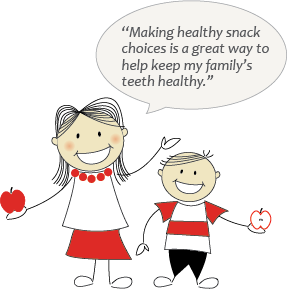Pregnancy and Teeth
Pregnancy is a special time to take extra care of your teeth and gums. During pregnancy your hormonal balance is altered and your gums become more susceptible to disease.
There is no truth in the old wive's tale that says a tooth is lost for every pregnancy. Good oral hygiene procedures will ensure that you have healthy teeth and gums during pregnancy.
Oral Health Guidelines
Plaque is essentially made up of bacteria. By using antibacterial products you can help control plaque formation.
Visit your dentist before you become pregnant and during pregnancy to make sure your teeth and gums stay strong and healthy.
- Brush twice a day and floss thoroughly every day.
- Use a soft toothbrush and a proven antibacterial fluoride toothpaste.
- Change your toothbrush regularly.
- Eat a nutritious diet from a wide variety of foods.
- Increase your calcium intake.
- Avoid frequent snacks that contain sugar.
If you are pregnant or suspect that you are, it is important to tell your dentist when you visit. Practitioners are careful in prescribing medicines to pregnant women and only advise those which are really needed. Certain medicines such as the tetracycline antibiotics can affect your baby's developing teeth.
If possible dental x-rays should be avoided during pregnancy, however, if your dentist considers it essential for you to have an x-ray, special care and protection will be taken.
- Before you become pregnant
It is important to establish good oral hygiene practices now so that when you become pregnant you will already have established a daily routine.
Dental plaque (bacteria) needs to be cleaned from the teeth and gumline by brushing and flossing every day. Brush twice a day with a soft toothbrush and fluoride toothpaste. Use dental floss daily to clean between your teeth where the toothbrush cannot reach. You can check how well you remove plaque by using special plaque disclosing tablets or solution. These are available from your chemist.
- Visit your dentist
It may be more comfortable for you to complete any dental treatment required before pregnancy especially as you may experience nausea and vomiting or become tired as your pregnancy progresses.
Now that you're pregnant
- Morning Sickness: The stomach contents are acidic and may dissolve some of the the tooth enamel. To avoid tooth damage after vomiting or gastric reflux don't brush your teeth if you have just vomited. Instead wipe a smear of fluoride toothpaste over the teeth and rinse with water.
- Gagging can often occur whilst brushing your teeth. If this makes you feel sick, try to concentrate on your breathing as you clean the back teeth. Brushing without toothpaste can also help but return to using fluoride toothpaste as soon as possible.
- Cravings may be experienced for certain foods. Frequent snacks and drinks, especially sweet ones, can lead to dental caries (decay). Choose a wide variety of snacks which are low in sugar, fat and salt and high in fibre. Drinks such as milk and water are recommended.
- Your gums may be easily irritated by dental plaque. When you become pregnant, the hormones in your body change. These hormones can cause your gums to become inflamed, and bleed. Clean your teeth and gums by brushing and flossing each day to reduce the irritation and keep the gums healthy. During your pregnancy, ask your dentist to check the condition of your gums and advise you further on how to care for them.
- Brushing is important, cleaning your teeth and brushing your gums twice a day will avoid plaque build up. Remember, each tooth has two five surfaces - a front, a back, two sides and a top. The only one sure way to prevent dental disease is to clean every surface.
- Fluoride strengthens the teeth and prevents decay. Fluoride is found in most toothpastes and your dentist can recommend you also have a fluoride mouth rinse or have a professional topical fluoride treatment. For your baby there is no clear evidence that taking fluoride tablets during pregnancy will strengthen the baby's developing teeth or help prevent decay for the baby's teeth. If water supply is not fluoridated then your dentist may advise that the baby have a fluoride supplement.
- Visiting your dentist can often occur whilst brushing your teeth. If this makes you feel sick, try to concentrate on your breathing as you clean the back teeth. Brushing without toothpaste can also help but return to using fluoride toothpaste as soon as possible.
- Calcium is very important. When you are four months pregnant your baby's teeth and bones begin to calcify. The calcium and phosphorous needed comes from what you eat and, if necessary, from your bones. These minerals do not come from your teeth.
When you are 7-9 months pregnant your baby needs more calcium and phosphorous. These minerals are best obtained by eating more dairy foods.
Milk and milk products are an excellent source of calcium. Choose those that are low in fat and sugar. If you don't drink milk or eat milk products such as cheese and yogurt choose other products that are high in calcium. If you are having difficulty see your doctor or dietitian for advice. They may recommend calcium supplements. The recommended daily intake per day for women is 1,100mg during pregnancy, and 1,200mg while breastfeeding.
Looking ahead
At first your newborn baby does not have decay causing bacteria in their mouth.
As the teeth come through the gum the bacteria that causes decay is passed to the baby by the main carer, usually the mother through kissing, food tasting or by cleaning the dummy in their own mouth.
It is important that carers thoroughly clean their own teeth and have all their own decayed teeth treated so they will have low levels of bacteria. This will reduce or greatly delay the transfer of these bacteria to the baby.
Source: Colgate Oral Care Brochure - Pregnancy and Oral Health


